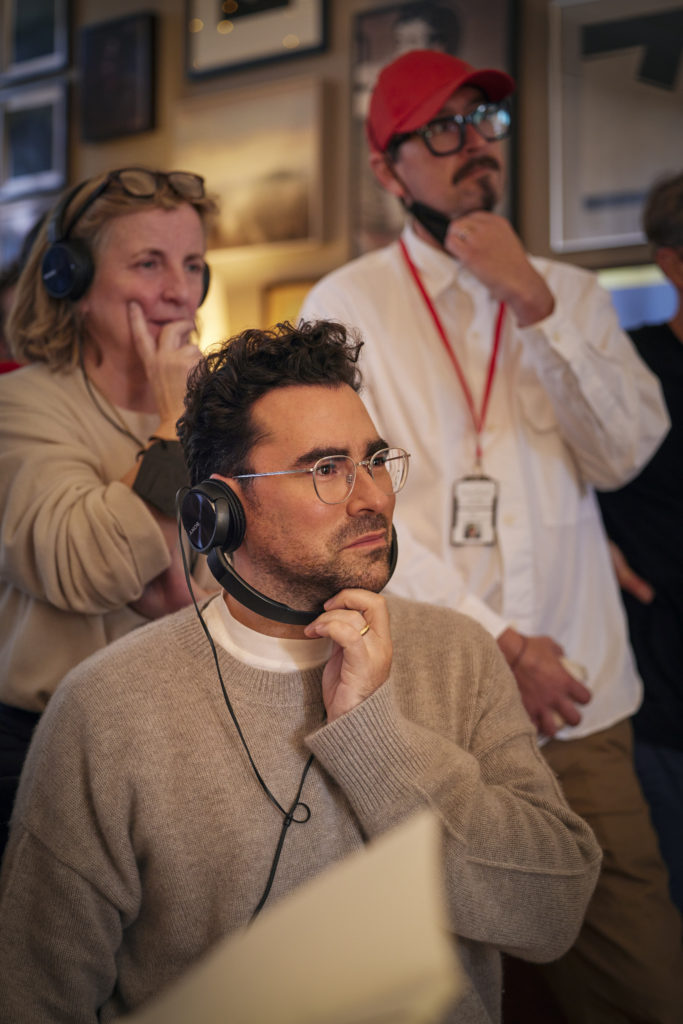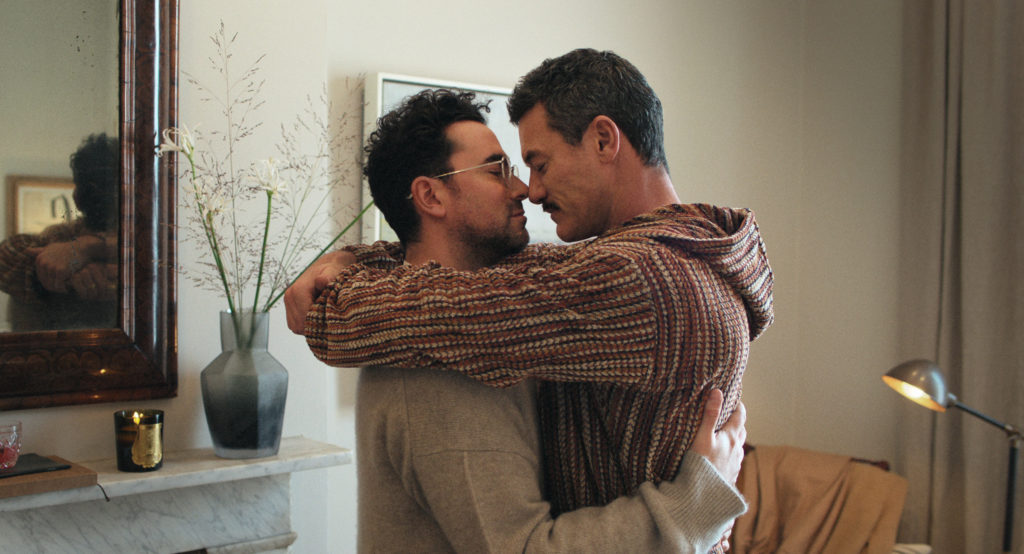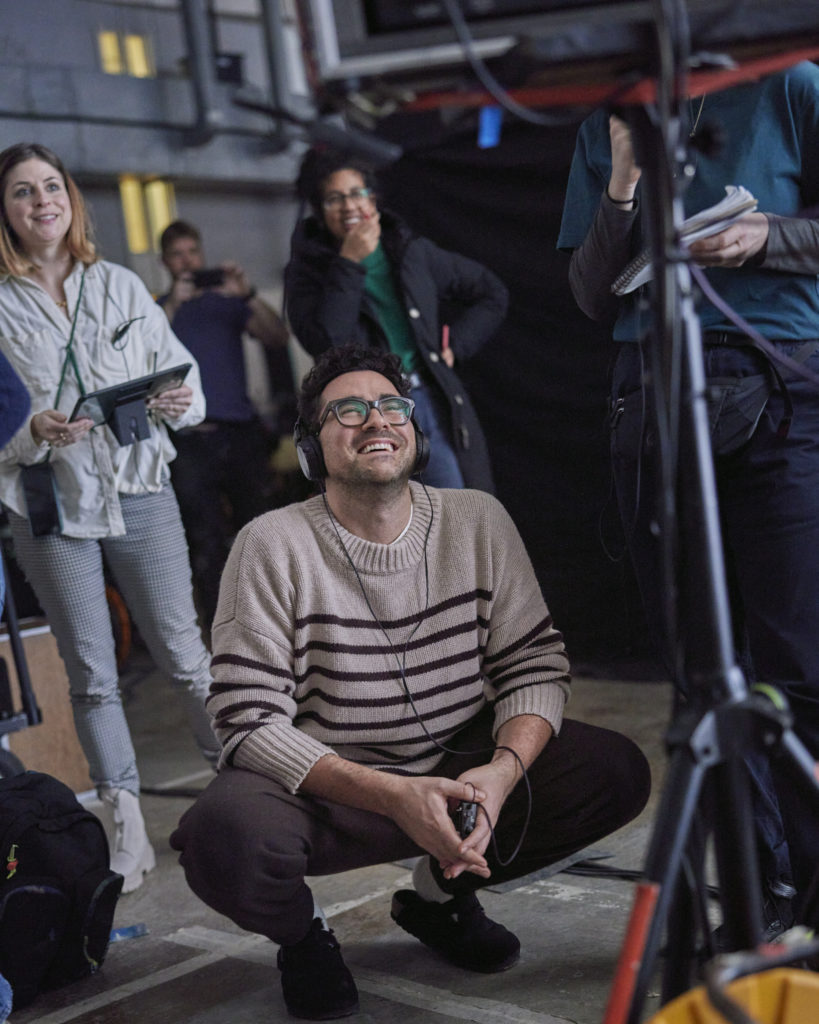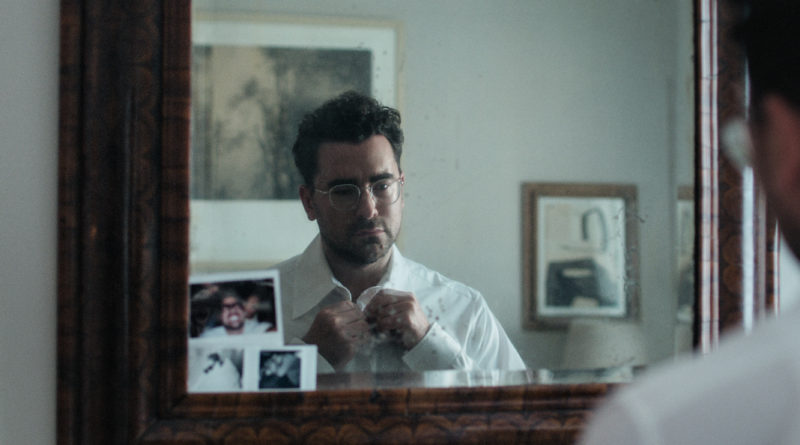Dan Levy Talks Grief and the Importance of Chosen Family
The ‘Schitt’s Creek’ creator plays a grieving husband in his directorial film debut, ‘Good Grief’
By Chris Azzopardi

The grief was very real for Dan Levy, who lost his grandma and rescue dog, Redmond, over the span of a couple of years during the pandemic. And then he did something very Dan Levy with that grief — he opened a blank page and got to work on “Good Grief,” a Netflix film, out now, that he wrote, directed and stars in.
The film is the “Schitt’s Creek” creator’s first major endeavor after his Emmy-winning show became a sleeper hit as the world shut down due to the Covid pandemic when we sheltered in place (in front of our TVs). In “Good Grief,” Levy plays Marc, an artist we meet at a Christmas party that ends tragically for his husband, Oliver (Luke Evans), who dies in a car accident right outside their place. Marc is left trying to make sense of his sudden loss and what he didn’t know about Oliver’s life before it ended, which takes him to a secret flat Oliver had in Paris. With Marc on his unexpected journey to healing his shattered self are his dearest friends, Sophie (Ruth Negga) and Thomas (Himesh Patel).
I recently spoke with Levy about the film, which he sees as an opportunity to flex new creative muscles, including his portrayal of a character who may be as stylish as David Rose even if he isn’t him, exactly.
It’s nice to have you back in regular conversation, Dan. It’s been a few years. The world was on a real Dan Levy kick for a while.
[Laughs.] I think it’s nice to take a break. It’s nice for everyone to take a break. You don’t want to ever overstay your welcome. So I’m happy that there’s something that I care about that I’m able to talk about now.
What goes through your mind when something that is so personal to you gets its wings and is released into the world?
Well, it’s tough because it’s done. And I care deeply about it, and that’s all that really kind of matters to me outside of the viewers that watch it and hopefully find some point of connectivity in it. It’s always a very sort of awkward thing to kind of have to sell your work.
But I’m really happy with it and it’s a movie that I know that I would like to watch and one that speaks to my life right now in a way that I feel is quite truthful. And yeah, it’s a weird thing to put it out there and then have people do what they will with it.
But at the end of the day, I’m grateful for the opportunity, ultimately. It’s a 180 from what people have come to know me from. And those opportunities don’t get handed out all the time. So I was really grateful that some people over at Netflix were willing to go in this new direction with me. And yeah, I’m just glad that there’s a movie out there that speaks to my life in a meaningful way, that speaks to friendship and found family and the fact that, for a lot of people out there who are without kids and without partners, that friendships are the great loves of our lives.
Did you draw from your own found family for the film?
I did. You know, I was realizing once you get into your 30s — I’m 40 now, but was 37 when I started developing the film — relationships change. Really good, long friendships. The more your life takes on weight, the more that applies to friendships and what we’re willing to compromise and what we’re willing not to, and the hard conversations we need to have in order to invest in our friendships so that they can have life going into the next 40 years of our lives.
It’s uncomfortable at times, but I’ve been finding myself having really meaningful, truthful conversations with friends through this desire to be OK. If you have a friendship that’s a decade or two decades old, there’s going to be some stuff that you need to talk about at some point, like an actual partner. And it’s about normalizing that, and the fact that those hard conversations are essentially an act of love. It’s an investment in a meaningful relationship.
How did working on this film help you process your own feelings around grief?
Writing it really was the first step. I was going through some grief. I lost my grandmother and I lost my dog. And it was the only thing I could do, really. I wasn’t able to articulate it vocally. And I sat down at my computer and just started to write an outline for this film, and it came quite naturally. And it has nothing to do with my own personal grief, but everything to do with the feelings and the detangling of those feelings and trying to understand what it all means.
So as a writer, I tend to put everything down on the page and see what happens. Between “Schitt’s Creek” and this movie, I’ve worked through a lot of stuff. And it’s good because you can put your life into a swath of different characters, and you’re able to ask questions of yourself and others by way of dialogue and the way that different characters interact with each other and process tragedy or love.
It’s all been this wonderful catharsis of sorts, and this movie was huge for me in that sense. It led me to this path of understanding that culminates in a scene toward the end of the movie between my character and [actor] Celia Imrie, where she ultimately says, “To avoid sadness is also to avoid love.” That was one of the big takeaways from this whole experience for me, and it just ended up on the page. And I didn’t really know where it came from, and yet it all was leading to that for me, that kind of revelation of the importance of being OK with sadness and letting it in and trying to understand it.

In your own experience and through your exploration of grief, how do you think queer people are impacted differently when it comes to loss?
I guess I can only really speak to my own experience because I think the community has experienced grief in so many different ways. And people are going to process it in so many different ways. I think for me, that really manifested in the friendships. In this idea of having a safety net of friends there to help you. Because I think for a lot of people in the community, they don’t have family to turn to. I’m very lucky that I do. But I think this idea of friendships helping to soften the blow of some real tragedy speaks to the community as a whole.
In both “Schitt’s Creek” and now “Good Grief,” wealthy characters comment in various ways on social class. Is there something you’re still trying to say about that topic with this movie?
I think so. I mean, I think in a way the character of Marc is such an avoidant, and essentially sort of ran away from his mother’s death into the arms of a very handsome and successful writer. And so Oliver’s success, I think there was something nice about showing a gay man who’s successful and living a wonderful life, despite the odds, despite where he came from. I think we hear through his father’s eulogy that it wasn’t the easiest upbringing, and yet he succeeded. So there was something nice about showing that.
But for Marc, it was all distraction. He was able to really run away from his sadness into the arms of this beautiful new life that was soft and comfortable and exciting and sexy and all of those sort of wonderful things that would allow him to quickly not forget, but repress. So this indulgence before helped to really set up Marc’s relationship to his husband’s success, and ultimately realizing that he doesn’t need it. He doesn’t need that life in the end. He needed something a little bit more grounded, and he needed a life that was more defined for himself.
When we spoke in 2018, “Schitt’s Creek” hadn’t become the cultural phenomenon that it eventually became. And kind of overnight, even though I know it was not overnight for you…
It kind of was, though. I think it was over the pandemic, which felt like both forever and a complete blink.
How weird to feel that during a pandemic, right?
It continues to be a very strange thing. I talk to the cast about it. It’s a very weird thing to go indoors for two years and come out a completely different person socially. It’s really disorienting. And you don’t get to be out and about and slowly start to understand that people know who you are.
It’s a very harsh confrontation of the fact that your life is completely different and your relationship with privacy is completely different. And it also doesn’t allow you any time to understand that you are, in fact, recognizable. So I think of that as a great opportunity, because there’s no ego attached to quote-unquote “fame” at this point because we’re all still confused about what’s going on, to be perfectly honest.
[Actor] Emma Corrin is a very close friend of mine, and they went through something very similar with “The Crown” over the pandemic as well, where suddenly everyone knew who they were, and yet we were all indoors. So we’re still kind of thawing to this new version of our lives. You can’t complain about it, obviously, because it’s off the back of great success and opportunity, but it is certainly disorienting and so weird.
Were you even more eager to leave your house after or during the pandemic to understand what it might feel like as “Schitt’s Creek” became a success?
No. It forced me into my house even more. [Laughs.] Now it takes more to get me out of the house, to be honest. Because it’s not something that I love, frankly. I accept it because it’s part of the job, but it’s certainly not something that I’m lusting after. And so yeah, it’s been very strange. It’s been wonderful. It’s great to hear people. I think fans of the show are so generous and so kind with how they approach me and the things that they say and the comfort that the show has brought them. So I think some fandoms can be really, really intense. I think the “Schitt’s Creek” fandom community is very kind.
They have a Canadian sensibility, even though they might not be Canadian?
Exactly. We’ve somehow succeeded in just Canadianizing our wonderful fans of the show.

Did you think intentionally about how to move yourself away as an actor from David considering how iconic that character has become?
It’s a wonderful thing because there’s a real personal connection, I guess, to the character and people feeling like they know me. I’m in some ways very close to David, and in some ways completely opposite. I think 80 episodes of doing the same character was the greatest experience, and yet you come out of it and you have a desire, as I think all actors do, to flex a different kind of muscle. And for me, I wanted to get into something a bit more dramatic. Unfortunately, given the culture of our industry, I only was receiving lesser versions of David Rose to play in other shows and movies.
And so I set out to write something for myself that I thought was a challenge. It was all very guttural. It was very instinctual. I didn’t have to strategize. I tended to just listen to where my gut was telling me to go. And it was a great challenge. And as an actor, it really forced me to shake some habits that had formed over 80 episodes of playing an incredibly elastic, reactive human being. The character of Marc in this movie is so still and so calm, and shaking some of those impulses to broaden the performance was a real challenge.
But I hope for anyone who becomes identified by way of a character: We should be so lucky. There’s that. If people recognize me as David Rose for the rest of my life, let that be the case. It’s so rare that you get to participate in anything that affects people in that kind of way. But at the same time, I wish for any actor who is kind of being put in a box by way of their previous performances, that they’d be given the opportunity to show range. I think we’ve seen historically really great comedy actors excel in drama: Robin Williams, Tom Hanks, Jim Carrey…
We have to shift this idea that if someone becomes recognizable for one thing, that that’s somehow all they can do. I love the idea of pushing actors outside of their comfort zones. And I think this movie did that with every actor, frankly, from Ruth [Negga] and Himesh [Patel] to Kaitlyn [Dever] and Emma. Everyone was playing slightly against type, which was really exciting to me.
Have you ever sent a David meme or GIF?
No. I’ve never sent a David GIF. I have sent an Alexis GIF. I think that’s as far as I’ll allow myself to go. I’m too scared of what it looks like to send a GIF of yourself. It’s the Canadian in me. I could never. It’s way too arrogant.
I have to ask you a question that everyone has been wondering: When will there be a “Schitt’s Creek” revival?
I don’t know if we’ll ever do it. You end on a high note. Listen, we as a culture want, want, want, want, want. We want it now. It’s binge culture. We want to watch an entire season of a television show in two days because that’s what we want. And yet, I think to not give people what they want is cool. And I think it forces them to return to the show. Think about all the shows that overstayed their welcome. You will never go back and rewatch episodes of those TV shows. The shows that I go back to over and over and over again are the shows that left at just the right time, and I go back because I want that feeling again.
I think we are in a culture now that’s even more critical than when “Schitt’s Creek” ended, frankly. And so I don’t know. If I wake up one day with an idea for a movie or a Christmas special or something, and it is fucking brilliant and uses everybody to the best of their ability, and all of our actors can come back and feel excited to be there and feel like we’re doing something fresh and new, great. That idea has not come to me, and I’m not entirely sure it will. But we will see.
Chris Azzopardi is the Editorial Director of Pride Source Media Group and Q Syndicate, the national LGBTQ+ wire service. He has interviewed a multitude of superstars, including Cher, Meryl Streep, Mariah Carey and Beyoncé. His work has also appeared in The New York Times, Vanity Fair, GQ and Billboard. Reach him via Twitter @chrisazzopardi.

